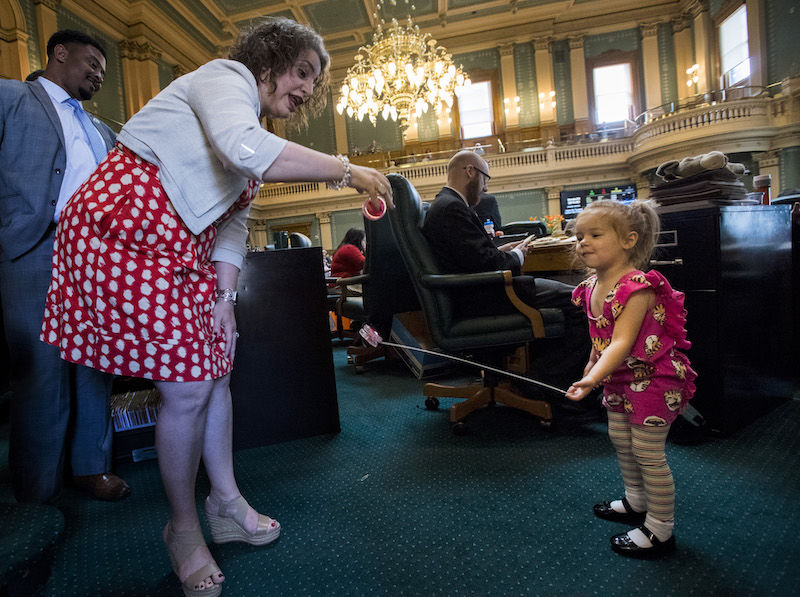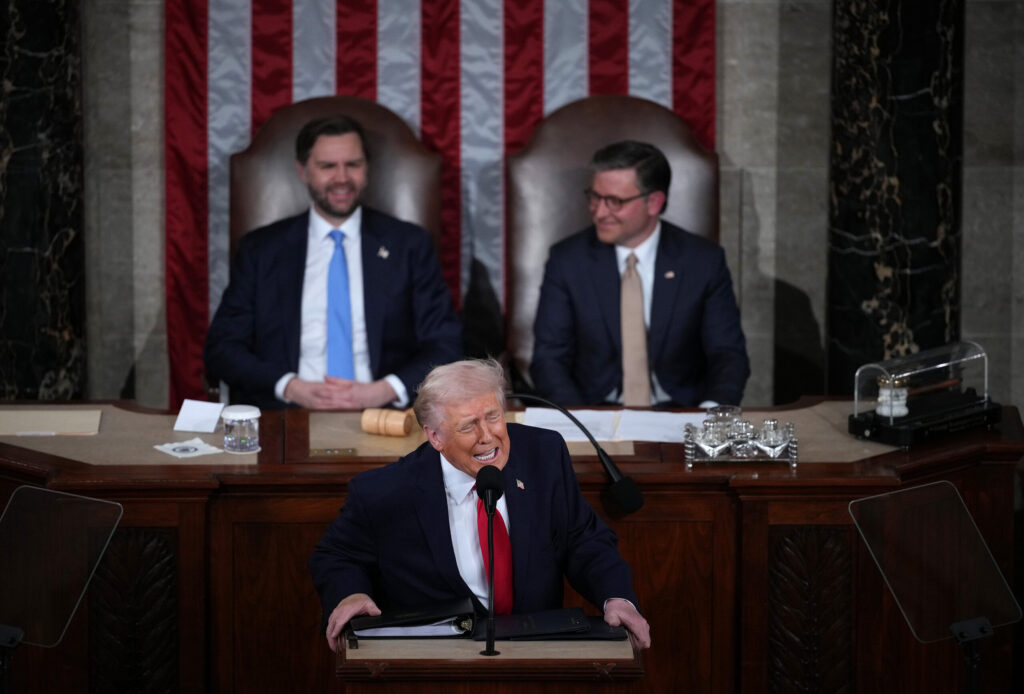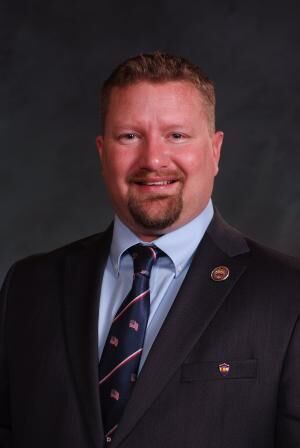Gavel falls on Colo. legislature’s brawls and breakthroughs

Denver Zoo brought birds and reptiles to show off at the Colorado Capitol Wednesday – fitting for the last day of a four-month legislative session that was at times a wild kingdom of laws, policies and politics, and at others a close encounter with the #MeToo era.
Lawmakers finally wrapped up their work in the Senate at 11:59 p.m.; the House officially adjourned at 12:14 a.m.
A last-minute filibuster by Democratic Sen. Irene Aguilar of Denver took the Senate right up to the deadline. The House spent its last hour on tributes to departing lawmakers.
Along the way, lawmakers put billions into transportation, tamed the public employees’ pension system and better regulated the state’s marijuana industry.
> PHOTOS: Sine die at the Colorado Capitol
Here’s a look at key measures that emerged from the 2018 General Assembly:
Imperiled PERA
As a mandatory midnight deadline to adjourn the session loomed, members of the House and Senate debated a compromise with high stakes – the solvency of the Colorado Public Employees’ Retirement Association for its more than 585,000 members, as well as the damage such a major unfunded liability could have on the state’s credit rating. The latter could have driven up the cost of government borrowing, from fixing roads to building schools.
The pension is facing a projected $32 billion shortfall over the next 30 years. The bill calls for the state to put in $225 million a year, working employees would pay 2 percent more from their paychecks, and retirees see their annual cost-of-living raises slip from 2 percent to 1.5, after two years with no increase.
As Democrats met in a caucus Wednesday night to consider the compromise, Gov. John Hickenlooper showed up and encouraged them to fight for a good compromise. He cautioned them that a special session was not wise, and some worried about a political standoff over such an important issue.
House Majority Leader KC Becker, one of the bill’s sponsors, told members, “If we fail to act in a responsible way it is on our conscience.”
She told members the compromise was the right thing to do.
Transportation and #MeToo
The night before, the General Assembly resolved another major endeavor of the session: transportation funding.
Senate Republicans and House Democrats, who hold majorities in those chambers, agreed to put $645 million into roads, bridges and alternative transportation in the next two years, then borrow $2.33 billion without asking to raise taxes. Senate Bill 1 was the first piece of legislation introduced in the upper chamber on the first day of the session back in January.
The session was roiled by the #MeToo movement, as six male legislators were formally accused of harassment or misbehavior. One, Rep. Steve Lebsock of Thornton, was expelled, and another, Sen. Randy Baumgardner of Hot Sulphur Springs, survived an expulsion hearing, though he lost a flock of permanent and interim committee assignments (and an estimated more than $7,000 in per diem) after more allegations against him became public.
On the last day of the session, legislative leaders canceled an 8 a.m. meeting to discuss the path ahead on the Capitol’s sexual harassment, because of a late night on Tuesday and a jammed scheduled on the final day of the session.
Civil rights compromise
Another skirmish that engulfed the final hours was re-authorization of the state’s Division of Civil Rights and Colorado Civil Rights Commission.
The agency has been a political football for almost the entire session, beginning when the Joint Budget Committee deadlocked over funding the agency in the next budget. That led to protests and eventually a bill from House Democrats that sought only a basic re-authorization of the agency.
That didn’t fly with Senate Republicans, who wanted to find a way to amend the commission’s mission to ensure there would never be another Masterpiece Cakeshop case, which conservatives said discriminated against the owner when he refused to make a cake for a same-sex couple. The case against the commission is before the U.S. Supreme Court.
A conference committee initially failed to come up with an agreement between the chambers. But late in the day, Sen. John Cooke of Greeley agreed to a compromise proposed by the House Democrats and a second conference committee nailed down the particulars.
Beer and pot
A bill about beer, Senate Bill 243, went through more changes than a newborn baby. The measure was intended to put into place regulations tied to a 2016 law that will allow grocery and convenience stores the authority to sell full-strength beer on Jan. 1.
The final compromise would allow 18- to 21-year-olds to sell beer in those stores, as well as liquor stores; require grocery and convenience stores to use their own employees to deliver beer to customers; and sets a 500-foot distance between stores that sell beer and the same distance between stores that sell beer and schools.
The House and Senate both approved the compromise late Wednesday night.
The legislature passed several regulations and concessions to the marijuana industry, including allowing “tasting rooms” in existing stores, where customers can try a one-serving sample, a step toward public use that might eventually lead to consumption clubs similar to bars.
They also authorized school nurses to administer medical marijuana.
“The Colorado legislature took a major step forward this year in honoring the will of Colorado voters when it comes to marijuana normalization,” said Peter Marcus, spokesman for Terrapin Care Station, a national cannabis company based in Boulder (and a former Colorado Politics reporter).
Give and take
Most of the day Wednesday, the House worked through tweaks to bills added by the Senate, as well as some significant changes, to other bills the chamber already had passed.
House Bill 1019 exposed the reality of making laws, however.
The legislation requires the state Department of Education to consider participation in K-12 advanced placement, concurrent enrollment and international baccalaureate programs in awarding accreditation points to schools. The bill the House passed 56-9 on April 26, however, had a bit of conflict with House Bill 1355, the Public School Accountability Act, that the House and Senate passed in April.
“If we hadn’t done the amendments in the Senate, then we would be amending a section (of the law) that no longer exists,” Rep. Mike Foote, D-Lafayette, said before the House voted to concur with the amended bill 64-0.
Paying tribute
Much of the day Wednesday was spent on tributes and humor. It’s a tradition that lawmakers speak about those who are leaving, usually by term limits. And leaders say their formal goodbyes from the speaker’s well, one last time.
Senate Majority Leader Chris Holbert, R-Parker, said it had been a pleasure to serve the current Senate President Kevin Grantham, R-Cañon City.
“He’s very gentle-hearted,” Holbert said. “He’s very intelligent. He’s very thoughtful. The Bible encourages us, teaches us to be slow to anger and quick to forgive. And that’s what I’ve seen in Kevin Grantham.”
Sen. Angela Williams, a rising-star Democrat from East Denver, said it was “a true joy to have that partnership” in Grantham’s willingness to look for common ground and co-sponsor difficult bills with her.
Grantham named former senators he enjoyed working with, Democrats and Republicans, and told a few stories.
“So many people, so many good memories, and that’s what I’ll love to remember about this place,” he told the Senate on his last day as a member.
Rep. Janet Buckner, D-Aurora, acknowledged Duran as the first Latina House speaker in state history.
She called Duran “truly an amazing figure in politics. We can’t acknowledge the importance of her work without first recognizing that she broke barriers.”
Sen. Lucia Guzman, D-Denver, is a pastor and it would not be an overstatement to say she is revered in the upper chamber by members of both parties, someone who is rarely criticized directly. She has led the Democratic caucus and she is seen as the heart and soul of the LGBTQ caucus.
She spoke of the bills she’s proud of, telling stories about the people the new laws affected and how helping them affected her.
“I’ll remember the cooperation we had and shared across the aisle,” she said, looking up to Grantham in the rostrum.
Then she shared her favorite Bible passage, 2 Timothy 4:7: “I have run the race. I have kept the faith, and I have finished my course.”













